A Critical Review of Environmental Law Implementation in Nigeria
VerifiedAdded on 2023/04/20
|19
|5884
|386
Essay
AI Summary
This essay provides a critical assessment of environmental law in Nigeria, examining the legal and policy framework based on the 1999 Constitution and subsequent environmental protection acts. It highlights key regulations concerning environmental permits, waste management, and liabilities for breaches of environmental law. The analysis identifies significant problems in environmental governance, including lack of funding, weak institutional capacity, corruption, and government indifference, which hinder effective implementation. The essay concludes with recommendations to address these issues, emphasizing the need for improved governance and law enforcement to protect Nigeria's environment. Desklib offers this essay along with a vast library of academic resources for students.
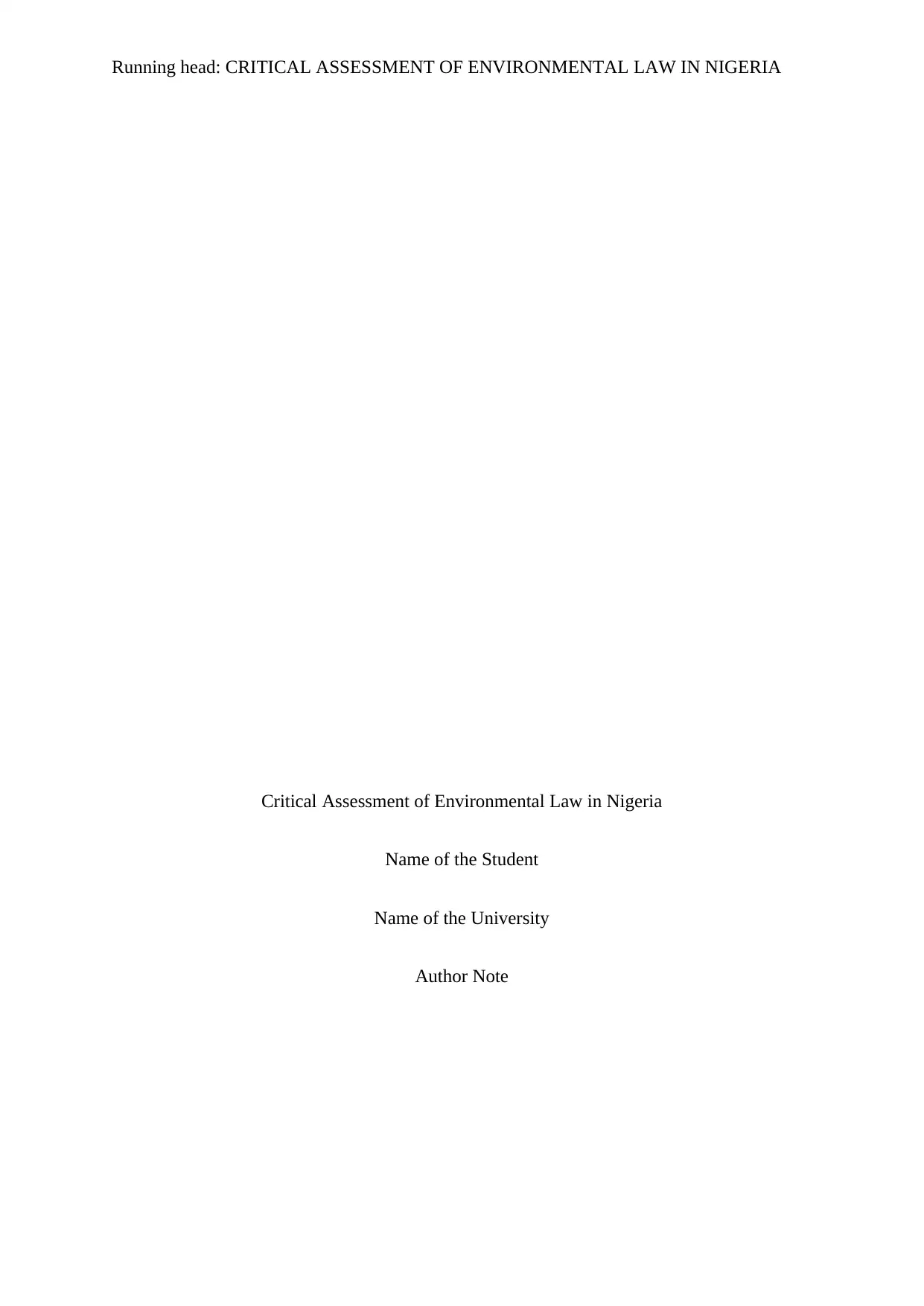
Running head: CRITICAL ASSESSMENT OF ENVIRONMENTAL LAW IN NIGERIA
Critical Assessment of Environmental Law in Nigeria
Name of the Student
Name of the University
Author Note
Critical Assessment of Environmental Law in Nigeria
Name of the Student
Name of the University
Author Note
Paraphrase This Document
Need a fresh take? Get an instant paraphrase of this document with our AI Paraphraser
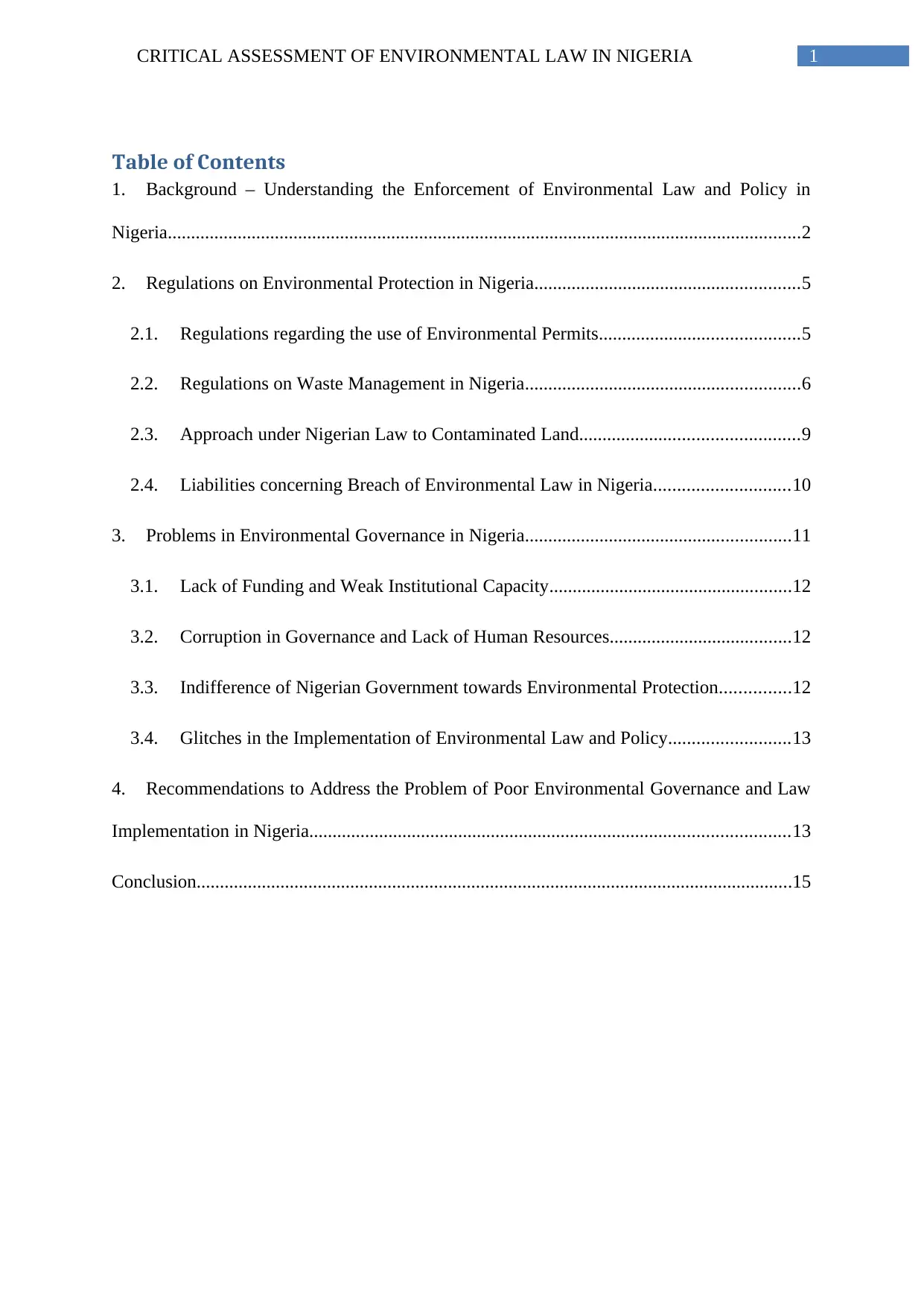
1CRITICAL ASSESSMENT OF ENVIRONMENTAL LAW IN NIGERIA
Table of Contents
1. Background – Understanding the Enforcement of Environmental Law and Policy in
Nigeria........................................................................................................................................2
2. Regulations on Environmental Protection in Nigeria.........................................................5
2.1. Regulations regarding the use of Environmental Permits...........................................5
2.2. Regulations on Waste Management in Nigeria...........................................................6
2.3. Approach under Nigerian Law to Contaminated Land...............................................9
2.4. Liabilities concerning Breach of Environmental Law in Nigeria.............................10
3. Problems in Environmental Governance in Nigeria.........................................................11
3.1. Lack of Funding and Weak Institutional Capacity....................................................12
3.2. Corruption in Governance and Lack of Human Resources.......................................12
3.3. Indifference of Nigerian Government towards Environmental Protection...............12
3.4. Glitches in the Implementation of Environmental Law and Policy..........................13
4. Recommendations to Address the Problem of Poor Environmental Governance and Law
Implementation in Nigeria.......................................................................................................13
Conclusion................................................................................................................................15
Table of Contents
1. Background – Understanding the Enforcement of Environmental Law and Policy in
Nigeria........................................................................................................................................2
2. Regulations on Environmental Protection in Nigeria.........................................................5
2.1. Regulations regarding the use of Environmental Permits...........................................5
2.2. Regulations on Waste Management in Nigeria...........................................................6
2.3. Approach under Nigerian Law to Contaminated Land...............................................9
2.4. Liabilities concerning Breach of Environmental Law in Nigeria.............................10
3. Problems in Environmental Governance in Nigeria.........................................................11
3.1. Lack of Funding and Weak Institutional Capacity....................................................12
3.2. Corruption in Governance and Lack of Human Resources.......................................12
3.3. Indifference of Nigerian Government towards Environmental Protection...............12
3.4. Glitches in the Implementation of Environmental Law and Policy..........................13
4. Recommendations to Address the Problem of Poor Environmental Governance and Law
Implementation in Nigeria.......................................................................................................13
Conclusion................................................................................................................................15
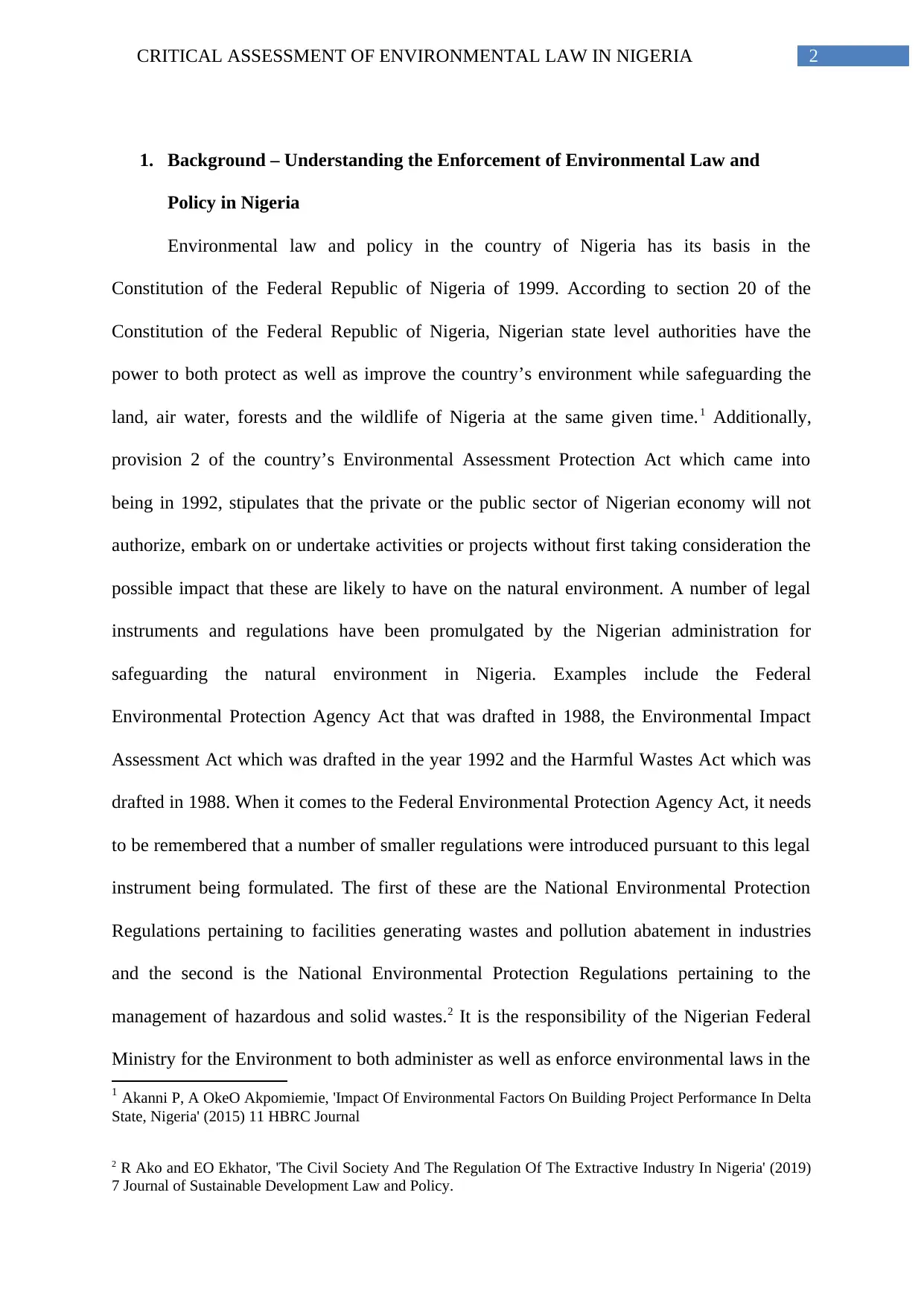
2CRITICAL ASSESSMENT OF ENVIRONMENTAL LAW IN NIGERIA
1. Background – Understanding the Enforcement of Environmental Law and
Policy in Nigeria
Environmental law and policy in the country of Nigeria has its basis in the
Constitution of the Federal Republic of Nigeria of 1999. According to section 20 of the
Constitution of the Federal Republic of Nigeria, Nigerian state level authorities have the
power to both protect as well as improve the country’s environment while safeguarding the
land, air water, forests and the wildlife of Nigeria at the same given time.1 Additionally,
provision 2 of the country’s Environmental Assessment Protection Act which came into
being in 1992, stipulates that the private or the public sector of Nigerian economy will not
authorize, embark on or undertake activities or projects without first taking consideration the
possible impact that these are likely to have on the natural environment. A number of legal
instruments and regulations have been promulgated by the Nigerian administration for
safeguarding the natural environment in Nigeria. Examples include the Federal
Environmental Protection Agency Act that was drafted in 1988, the Environmental Impact
Assessment Act which was drafted in the year 1992 and the Harmful Wastes Act which was
drafted in 1988. When it comes to the Federal Environmental Protection Agency Act, it needs
to be remembered that a number of smaller regulations were introduced pursuant to this legal
instrument being formulated. The first of these are the National Environmental Protection
Regulations pertaining to facilities generating wastes and pollution abatement in industries
and the second is the National Environmental Protection Regulations pertaining to the
management of hazardous and solid wastes.2 It is the responsibility of the Nigerian Federal
Ministry for the Environment to both administer as well as enforce environmental laws in the
1 Akanni P, A OkeO Akpomiemie, 'Impact Of Environmental Factors On Building Project Performance In Delta
State, Nigeria' (2015) 11 HBRC Journal
2 R Ako and EO Ekhator, 'The Civil Society And The Regulation Of The Extractive Industry In Nigeria' (2019)
7 Journal of Sustainable Development Law and Policy.
1. Background – Understanding the Enforcement of Environmental Law and
Policy in Nigeria
Environmental law and policy in the country of Nigeria has its basis in the
Constitution of the Federal Republic of Nigeria of 1999. According to section 20 of the
Constitution of the Federal Republic of Nigeria, Nigerian state level authorities have the
power to both protect as well as improve the country’s environment while safeguarding the
land, air water, forests and the wildlife of Nigeria at the same given time.1 Additionally,
provision 2 of the country’s Environmental Assessment Protection Act which came into
being in 1992, stipulates that the private or the public sector of Nigerian economy will not
authorize, embark on or undertake activities or projects without first taking consideration the
possible impact that these are likely to have on the natural environment. A number of legal
instruments and regulations have been promulgated by the Nigerian administration for
safeguarding the natural environment in Nigeria. Examples include the Federal
Environmental Protection Agency Act that was drafted in 1988, the Environmental Impact
Assessment Act which was drafted in the year 1992 and the Harmful Wastes Act which was
drafted in 1988. When it comes to the Federal Environmental Protection Agency Act, it needs
to be remembered that a number of smaller regulations were introduced pursuant to this legal
instrument being formulated. The first of these are the National Environmental Protection
Regulations pertaining to facilities generating wastes and pollution abatement in industries
and the second is the National Environmental Protection Regulations pertaining to the
management of hazardous and solid wastes.2 It is the responsibility of the Nigerian Federal
Ministry for the Environment to both administer as well as enforce environmental laws in the
1 Akanni P, A OkeO Akpomiemie, 'Impact Of Environmental Factors On Building Project Performance In Delta
State, Nigeria' (2015) 11 HBRC Journal
2 R Ako and EO Ekhator, 'The Civil Society And The Regulation Of The Extractive Industry In Nigeria' (2019)
7 Journal of Sustainable Development Law and Policy.
⊘ This is a preview!⊘
Do you want full access?
Subscribe today to unlock all pages.

Trusted by 1+ million students worldwide
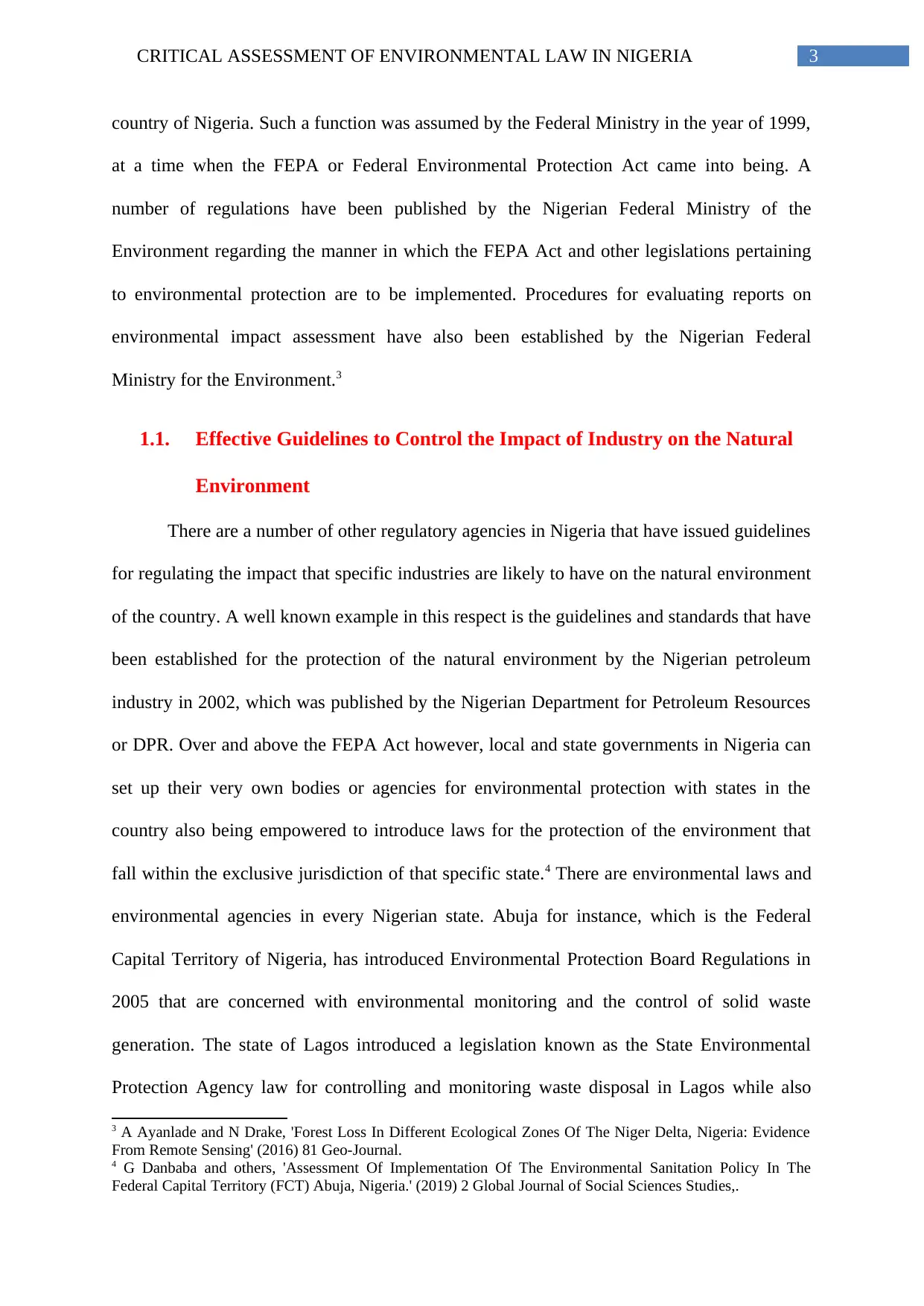
3CRITICAL ASSESSMENT OF ENVIRONMENTAL LAW IN NIGERIA
country of Nigeria. Such a function was assumed by the Federal Ministry in the year of 1999,
at a time when the FEPA or Federal Environmental Protection Act came into being. A
number of regulations have been published by the Nigerian Federal Ministry of the
Environment regarding the manner in which the FEPA Act and other legislations pertaining
to environmental protection are to be implemented. Procedures for evaluating reports on
environmental impact assessment have also been established by the Nigerian Federal
Ministry for the Environment.3
1.1. Effective Guidelines to Control the Impact of Industry on the Natural
Environment
There are a number of other regulatory agencies in Nigeria that have issued guidelines
for regulating the impact that specific industries are likely to have on the natural environment
of the country. A well known example in this respect is the guidelines and standards that have
been established for the protection of the natural environment by the Nigerian petroleum
industry in 2002, which was published by the Nigerian Department for Petroleum Resources
or DPR. Over and above the FEPA Act however, local and state governments in Nigeria can
set up their very own bodies or agencies for environmental protection with states in the
country also being empowered to introduce laws for the protection of the environment that
fall within the exclusive jurisdiction of that specific state.4 There are environmental laws and
environmental agencies in every Nigerian state. Abuja for instance, which is the Federal
Capital Territory of Nigeria, has introduced Environmental Protection Board Regulations in
2005 that are concerned with environmental monitoring and the control of solid waste
generation. The state of Lagos introduced a legislation known as the State Environmental
Protection Agency law for controlling and monitoring waste disposal in Lagos while also
3 A Ayanlade and N Drake, 'Forest Loss In Different Ecological Zones Of The Niger Delta, Nigeria: Evidence
From Remote Sensing' (2016) 81 Geo-Journal.
4 G Danbaba and others, 'Assessment Of Implementation Of The Environmental Sanitation Policy In The
Federal Capital Territory (FCT) Abuja, Nigeria.' (2019) 2 Global Journal of Social Sciences Studies,.
country of Nigeria. Such a function was assumed by the Federal Ministry in the year of 1999,
at a time when the FEPA or Federal Environmental Protection Act came into being. A
number of regulations have been published by the Nigerian Federal Ministry of the
Environment regarding the manner in which the FEPA Act and other legislations pertaining
to environmental protection are to be implemented. Procedures for evaluating reports on
environmental impact assessment have also been established by the Nigerian Federal
Ministry for the Environment.3
1.1. Effective Guidelines to Control the Impact of Industry on the Natural
Environment
There are a number of other regulatory agencies in Nigeria that have issued guidelines
for regulating the impact that specific industries are likely to have on the natural environment
of the country. A well known example in this respect is the guidelines and standards that have
been established for the protection of the natural environment by the Nigerian petroleum
industry in 2002, which was published by the Nigerian Department for Petroleum Resources
or DPR. Over and above the FEPA Act however, local and state governments in Nigeria can
set up their very own bodies or agencies for environmental protection with states in the
country also being empowered to introduce laws for the protection of the environment that
fall within the exclusive jurisdiction of that specific state.4 There are environmental laws and
environmental agencies in every Nigerian state. Abuja for instance, which is the Federal
Capital Territory of Nigeria, has introduced Environmental Protection Board Regulations in
2005 that are concerned with environmental monitoring and the control of solid waste
generation. The state of Lagos introduced a legislation known as the State Environmental
Protection Agency law for controlling and monitoring waste disposal in Lagos while also
3 A Ayanlade and N Drake, 'Forest Loss In Different Ecological Zones Of The Niger Delta, Nigeria: Evidence
From Remote Sensing' (2016) 81 Geo-Journal.
4 G Danbaba and others, 'Assessment Of Implementation Of The Environmental Sanitation Policy In The
Federal Capital Territory (FCT) Abuja, Nigeria.' (2019) 2 Global Journal of Social Sciences Studies,.
Paraphrase This Document
Need a fresh take? Get an instant paraphrase of this document with our AI Paraphraser
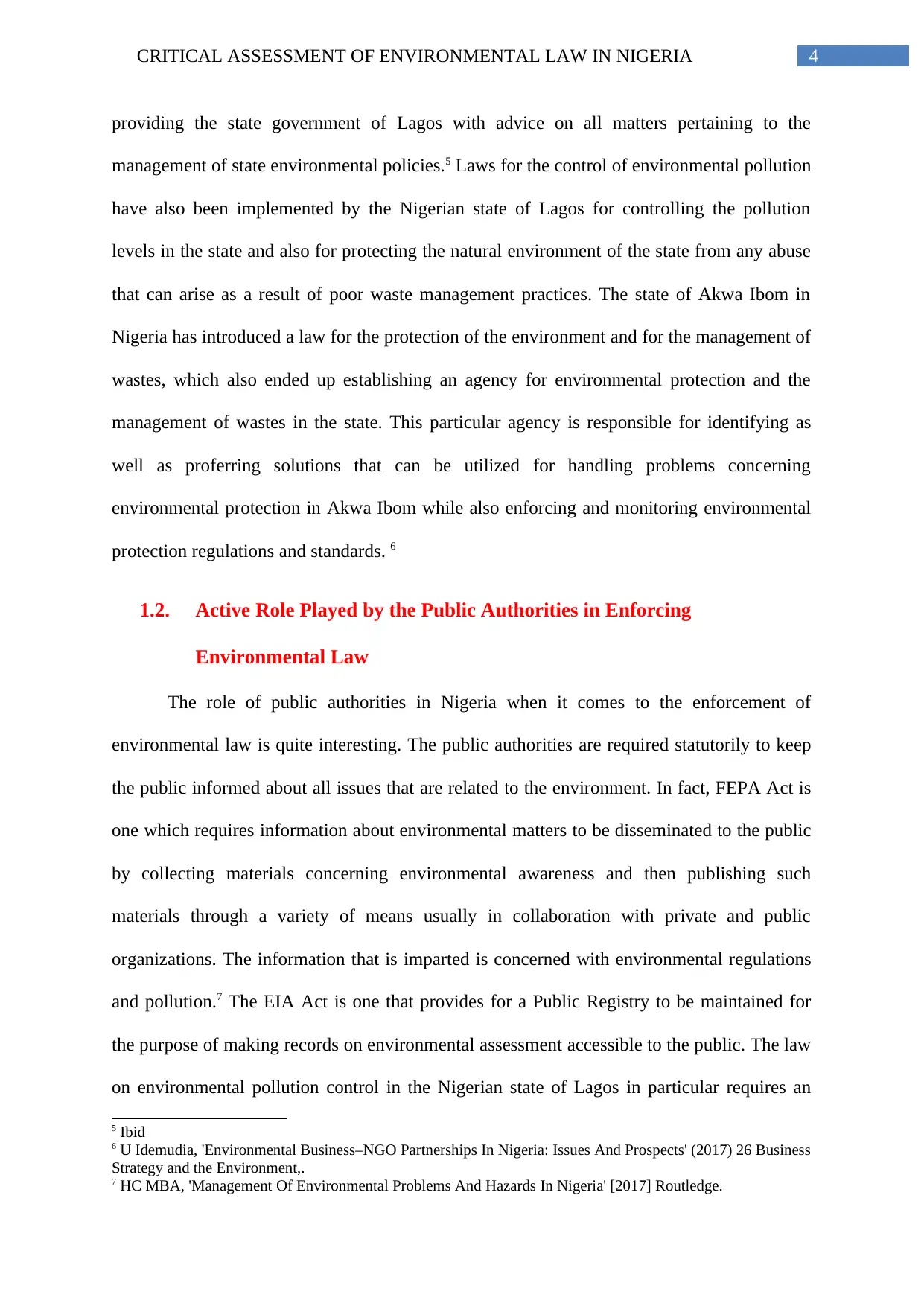
4CRITICAL ASSESSMENT OF ENVIRONMENTAL LAW IN NIGERIA
providing the state government of Lagos with advice on all matters pertaining to the
management of state environmental policies.5 Laws for the control of environmental pollution
have also been implemented by the Nigerian state of Lagos for controlling the pollution
levels in the state and also for protecting the natural environment of the state from any abuse
that can arise as a result of poor waste management practices. The state of Akwa Ibom in
Nigeria has introduced a law for the protection of the environment and for the management of
wastes, which also ended up establishing an agency for environmental protection and the
management of wastes in the state. This particular agency is responsible for identifying as
well as proferring solutions that can be utilized for handling problems concerning
environmental protection in Akwa Ibom while also enforcing and monitoring environmental
protection regulations and standards. 6
1.2. Active Role Played by the Public Authorities in Enforcing
Environmental Law
The role of public authorities in Nigeria when it comes to the enforcement of
environmental law is quite interesting. The public authorities are required statutorily to keep
the public informed about all issues that are related to the environment. In fact, FEPA Act is
one which requires information about environmental matters to be disseminated to the public
by collecting materials concerning environmental awareness and then publishing such
materials through a variety of means usually in collaboration with private and public
organizations. The information that is imparted is concerned with environmental regulations
and pollution.7 The EIA Act is one that provides for a Public Registry to be maintained for
the purpose of making records on environmental assessment accessible to the public. The law
on environmental pollution control in the Nigerian state of Lagos in particular requires an
5 Ibid
6 U Idemudia, 'Environmental Business–NGO Partnerships In Nigeria: Issues And Prospects' (2017) 26 Business
Strategy and the Environment,.
7 HC MBA, 'Management Of Environmental Problems And Hazards In Nigeria' [2017] Routledge.
providing the state government of Lagos with advice on all matters pertaining to the
management of state environmental policies.5 Laws for the control of environmental pollution
have also been implemented by the Nigerian state of Lagos for controlling the pollution
levels in the state and also for protecting the natural environment of the state from any abuse
that can arise as a result of poor waste management practices. The state of Akwa Ibom in
Nigeria has introduced a law for the protection of the environment and for the management of
wastes, which also ended up establishing an agency for environmental protection and the
management of wastes in the state. This particular agency is responsible for identifying as
well as proferring solutions that can be utilized for handling problems concerning
environmental protection in Akwa Ibom while also enforcing and monitoring environmental
protection regulations and standards. 6
1.2. Active Role Played by the Public Authorities in Enforcing
Environmental Law
The role of public authorities in Nigeria when it comes to the enforcement of
environmental law is quite interesting. The public authorities are required statutorily to keep
the public informed about all issues that are related to the environment. In fact, FEPA Act is
one which requires information about environmental matters to be disseminated to the public
by collecting materials concerning environmental awareness and then publishing such
materials through a variety of means usually in collaboration with private and public
organizations. The information that is imparted is concerned with environmental regulations
and pollution.7 The EIA Act is one that provides for a Public Registry to be maintained for
the purpose of making records on environmental assessment accessible to the public. The law
on environmental pollution control in the Nigerian state of Lagos in particular requires an
5 Ibid
6 U Idemudia, 'Environmental Business–NGO Partnerships In Nigeria: Issues And Prospects' (2017) 26 Business
Strategy and the Environment,.
7 HC MBA, 'Management Of Environmental Problems And Hazards In Nigeria' [2017] Routledge.
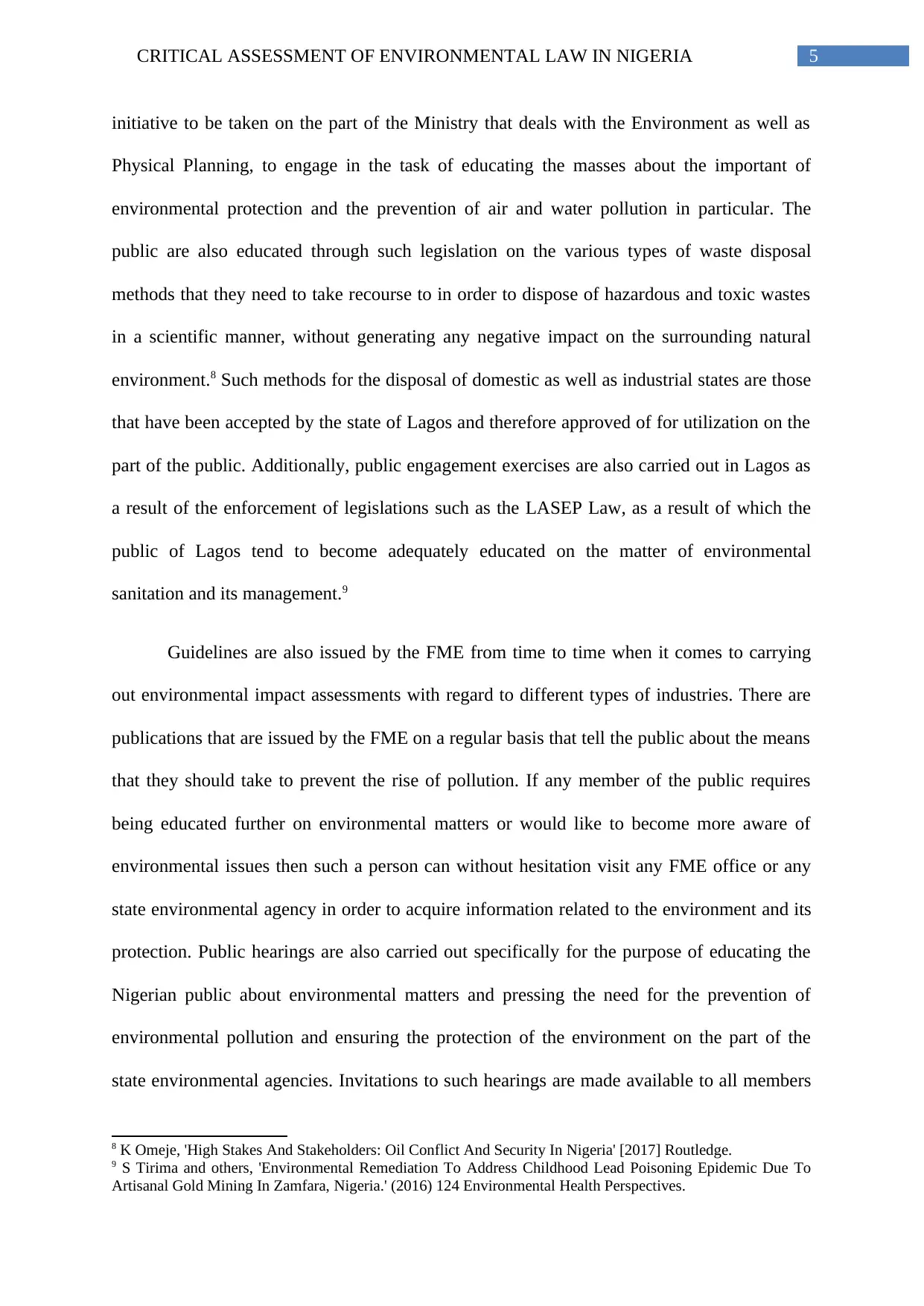
5CRITICAL ASSESSMENT OF ENVIRONMENTAL LAW IN NIGERIA
initiative to be taken on the part of the Ministry that deals with the Environment as well as
Physical Planning, to engage in the task of educating the masses about the important of
environmental protection and the prevention of air and water pollution in particular. The
public are also educated through such legislation on the various types of waste disposal
methods that they need to take recourse to in order to dispose of hazardous and toxic wastes
in a scientific manner, without generating any negative impact on the surrounding natural
environment.8 Such methods for the disposal of domestic as well as industrial states are those
that have been accepted by the state of Lagos and therefore approved of for utilization on the
part of the public. Additionally, public engagement exercises are also carried out in Lagos as
a result of the enforcement of legislations such as the LASEP Law, as a result of which the
public of Lagos tend to become adequately educated on the matter of environmental
sanitation and its management.9
Guidelines are also issued by the FME from time to time when it comes to carrying
out environmental impact assessments with regard to different types of industries. There are
publications that are issued by the FME on a regular basis that tell the public about the means
that they should take to prevent the rise of pollution. If any member of the public requires
being educated further on environmental matters or would like to become more aware of
environmental issues then such a person can without hesitation visit any FME office or any
state environmental agency in order to acquire information related to the environment and its
protection. Public hearings are also carried out specifically for the purpose of educating the
Nigerian public about environmental matters and pressing the need for the prevention of
environmental pollution and ensuring the protection of the environment on the part of the
state environmental agencies. Invitations to such hearings are made available to all members
8 K Omeje, 'High Stakes And Stakeholders: Oil Conflict And Security In Nigeria' [2017] Routledge.
9 S Tirima and others, 'Environmental Remediation To Address Childhood Lead Poisoning Epidemic Due To
Artisanal Gold Mining In Zamfara, Nigeria.' (2016) 124 Environmental Health Perspectives.
initiative to be taken on the part of the Ministry that deals with the Environment as well as
Physical Planning, to engage in the task of educating the masses about the important of
environmental protection and the prevention of air and water pollution in particular. The
public are also educated through such legislation on the various types of waste disposal
methods that they need to take recourse to in order to dispose of hazardous and toxic wastes
in a scientific manner, without generating any negative impact on the surrounding natural
environment.8 Such methods for the disposal of domestic as well as industrial states are those
that have been accepted by the state of Lagos and therefore approved of for utilization on the
part of the public. Additionally, public engagement exercises are also carried out in Lagos as
a result of the enforcement of legislations such as the LASEP Law, as a result of which the
public of Lagos tend to become adequately educated on the matter of environmental
sanitation and its management.9
Guidelines are also issued by the FME from time to time when it comes to carrying
out environmental impact assessments with regard to different types of industries. There are
publications that are issued by the FME on a regular basis that tell the public about the means
that they should take to prevent the rise of pollution. If any member of the public requires
being educated further on environmental matters or would like to become more aware of
environmental issues then such a person can without hesitation visit any FME office or any
state environmental agency in order to acquire information related to the environment and its
protection. Public hearings are also carried out specifically for the purpose of educating the
Nigerian public about environmental matters and pressing the need for the prevention of
environmental pollution and ensuring the protection of the environment on the part of the
state environmental agencies. Invitations to such hearings are made available to all members
8 K Omeje, 'High Stakes And Stakeholders: Oil Conflict And Security In Nigeria' [2017] Routledge.
9 S Tirima and others, 'Environmental Remediation To Address Childhood Lead Poisoning Epidemic Due To
Artisanal Gold Mining In Zamfara, Nigeria.' (2016) 124 Environmental Health Perspectives.
⊘ This is a preview!⊘
Do you want full access?
Subscribe today to unlock all pages.

Trusted by 1+ million students worldwide
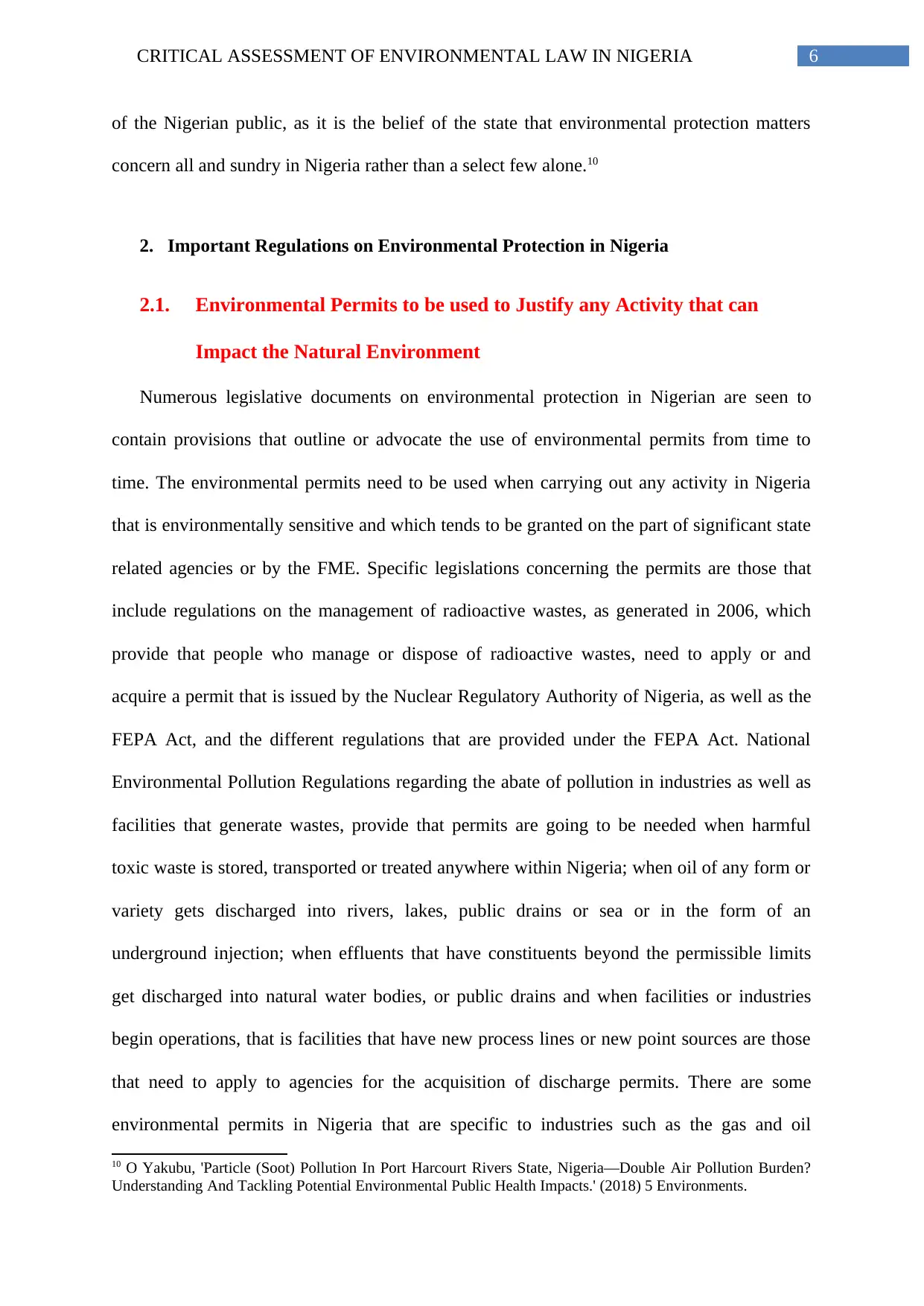
6CRITICAL ASSESSMENT OF ENVIRONMENTAL LAW IN NIGERIA
of the Nigerian public, as it is the belief of the state that environmental protection matters
concern all and sundry in Nigeria rather than a select few alone.10
2. Important Regulations on Environmental Protection in Nigeria
2.1. Environmental Permits to be used to Justify any Activity that can
Impact the Natural Environment
Numerous legislative documents on environmental protection in Nigerian are seen to
contain provisions that outline or advocate the use of environmental permits from time to
time. The environmental permits need to be used when carrying out any activity in Nigeria
that is environmentally sensitive and which tends to be granted on the part of significant state
related agencies or by the FME. Specific legislations concerning the permits are those that
include regulations on the management of radioactive wastes, as generated in 2006, which
provide that people who manage or dispose of radioactive wastes, need to apply or and
acquire a permit that is issued by the Nuclear Regulatory Authority of Nigeria, as well as the
FEPA Act, and the different regulations that are provided under the FEPA Act. National
Environmental Pollution Regulations regarding the abate of pollution in industries as well as
facilities that generate wastes, provide that permits are going to be needed when harmful
toxic waste is stored, transported or treated anywhere within Nigeria; when oil of any form or
variety gets discharged into rivers, lakes, public drains or sea or in the form of an
underground injection; when effluents that have constituents beyond the permissible limits
get discharged into natural water bodies, or public drains and when facilities or industries
begin operations, that is facilities that have new process lines or new point sources are those
that need to apply to agencies for the acquisition of discharge permits. There are some
environmental permits in Nigeria that are specific to industries such as the gas and oil
10 O Yakubu, 'Particle (Soot) Pollution In Port Harcourt Rivers State, Nigeria—Double Air Pollution Burden?
Understanding And Tackling Potential Environmental Public Health Impacts.' (2018) 5 Environments.
of the Nigerian public, as it is the belief of the state that environmental protection matters
concern all and sundry in Nigeria rather than a select few alone.10
2. Important Regulations on Environmental Protection in Nigeria
2.1. Environmental Permits to be used to Justify any Activity that can
Impact the Natural Environment
Numerous legislative documents on environmental protection in Nigerian are seen to
contain provisions that outline or advocate the use of environmental permits from time to
time. The environmental permits need to be used when carrying out any activity in Nigeria
that is environmentally sensitive and which tends to be granted on the part of significant state
related agencies or by the FME. Specific legislations concerning the permits are those that
include regulations on the management of radioactive wastes, as generated in 2006, which
provide that people who manage or dispose of radioactive wastes, need to apply or and
acquire a permit that is issued by the Nuclear Regulatory Authority of Nigeria, as well as the
FEPA Act, and the different regulations that are provided under the FEPA Act. National
Environmental Pollution Regulations regarding the abate of pollution in industries as well as
facilities that generate wastes, provide that permits are going to be needed when harmful
toxic waste is stored, transported or treated anywhere within Nigeria; when oil of any form or
variety gets discharged into rivers, lakes, public drains or sea or in the form of an
underground injection; when effluents that have constituents beyond the permissible limits
get discharged into natural water bodies, or public drains and when facilities or industries
begin operations, that is facilities that have new process lines or new point sources are those
that need to apply to agencies for the acquisition of discharge permits. There are some
environmental permits in Nigeria that are specific to industries such as the gas and oil
10 O Yakubu, 'Particle (Soot) Pollution In Port Harcourt Rivers State, Nigeria—Double Air Pollution Burden?
Understanding And Tackling Potential Environmental Public Health Impacts.' (2018) 5 Environments.
Paraphrase This Document
Need a fresh take? Get an instant paraphrase of this document with our AI Paraphraser
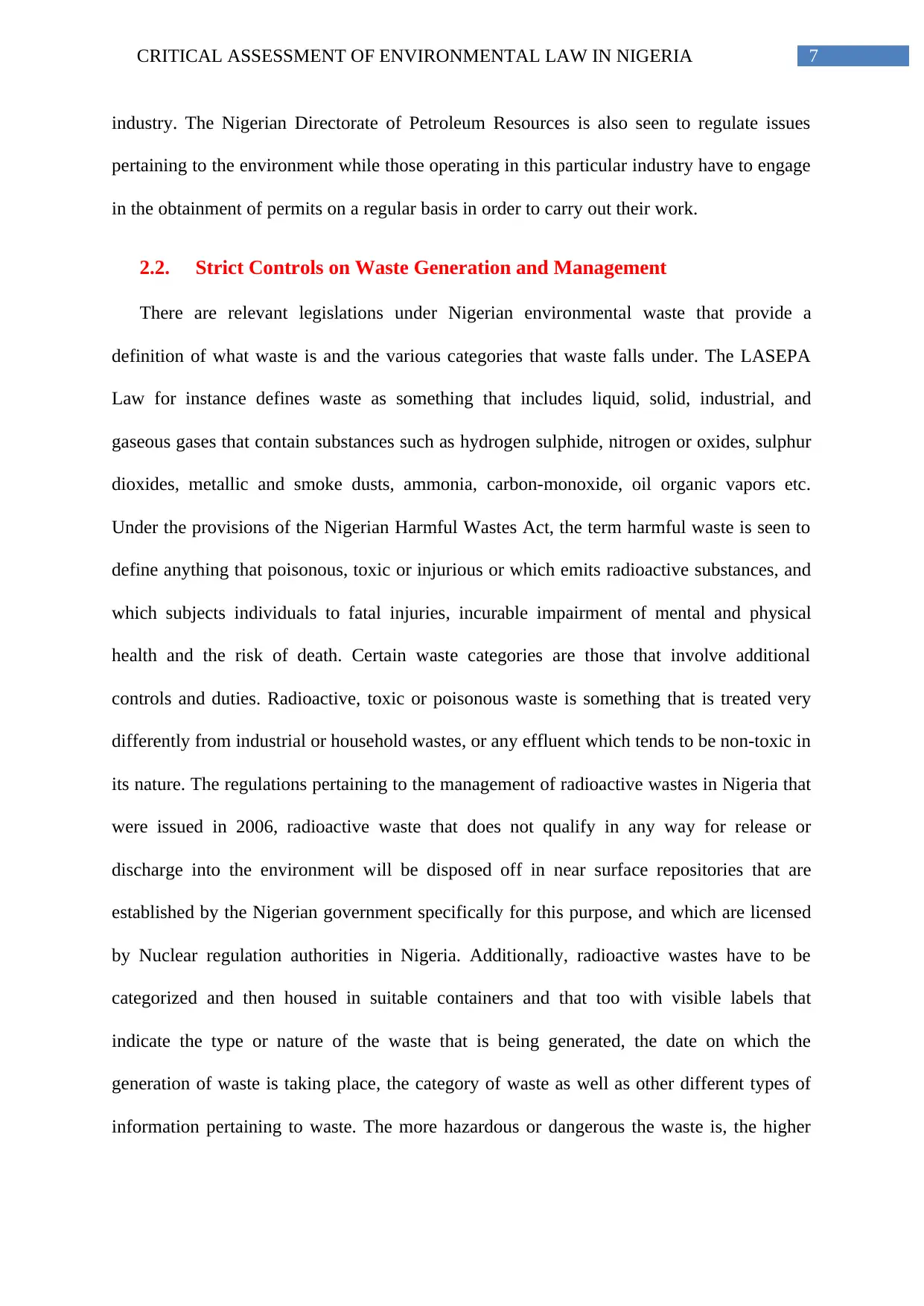
7CRITICAL ASSESSMENT OF ENVIRONMENTAL LAW IN NIGERIA
industry. The Nigerian Directorate of Petroleum Resources is also seen to regulate issues
pertaining to the environment while those operating in this particular industry have to engage
in the obtainment of permits on a regular basis in order to carry out their work.
2.2. Strict Controls on Waste Generation and Management
There are relevant legislations under Nigerian environmental waste that provide a
definition of what waste is and the various categories that waste falls under. The LASEPA
Law for instance defines waste as something that includes liquid, solid, industrial, and
gaseous gases that contain substances such as hydrogen sulphide, nitrogen or oxides, sulphur
dioxides, metallic and smoke dusts, ammonia, carbon-monoxide, oil organic vapors etc.
Under the provisions of the Nigerian Harmful Wastes Act, the term harmful waste is seen to
define anything that poisonous, toxic or injurious or which emits radioactive substances, and
which subjects individuals to fatal injuries, incurable impairment of mental and physical
health and the risk of death. Certain waste categories are those that involve additional
controls and duties. Radioactive, toxic or poisonous waste is something that is treated very
differently from industrial or household wastes, or any effluent which tends to be non-toxic in
its nature. The regulations pertaining to the management of radioactive wastes in Nigeria that
were issued in 2006, radioactive waste that does not qualify in any way for release or
discharge into the environment will be disposed off in near surface repositories that are
established by the Nigerian government specifically for this purpose, and which are licensed
by Nuclear regulation authorities in Nigeria. Additionally, radioactive wastes have to be
categorized and then housed in suitable containers and that too with visible labels that
indicate the type or nature of the waste that is being generated, the date on which the
generation of waste is taking place, the category of waste as well as other different types of
information pertaining to waste. The more hazardous or dangerous the waste is, the higher
industry. The Nigerian Directorate of Petroleum Resources is also seen to regulate issues
pertaining to the environment while those operating in this particular industry have to engage
in the obtainment of permits on a regular basis in order to carry out their work.
2.2. Strict Controls on Waste Generation and Management
There are relevant legislations under Nigerian environmental waste that provide a
definition of what waste is and the various categories that waste falls under. The LASEPA
Law for instance defines waste as something that includes liquid, solid, industrial, and
gaseous gases that contain substances such as hydrogen sulphide, nitrogen or oxides, sulphur
dioxides, metallic and smoke dusts, ammonia, carbon-monoxide, oil organic vapors etc.
Under the provisions of the Nigerian Harmful Wastes Act, the term harmful waste is seen to
define anything that poisonous, toxic or injurious or which emits radioactive substances, and
which subjects individuals to fatal injuries, incurable impairment of mental and physical
health and the risk of death. Certain waste categories are those that involve additional
controls and duties. Radioactive, toxic or poisonous waste is something that is treated very
differently from industrial or household wastes, or any effluent which tends to be non-toxic in
its nature. The regulations pertaining to the management of radioactive wastes in Nigeria that
were issued in 2006, radioactive waste that does not qualify in any way for release or
discharge into the environment will be disposed off in near surface repositories that are
established by the Nigerian government specifically for this purpose, and which are licensed
by Nuclear regulation authorities in Nigeria. Additionally, radioactive wastes have to be
categorized and then housed in suitable containers and that too with visible labels that
indicate the type or nature of the waste that is being generated, the date on which the
generation of waste is taking place, the category of waste as well as other different types of
information pertaining to waste. The more hazardous or dangerous the waste is, the higher
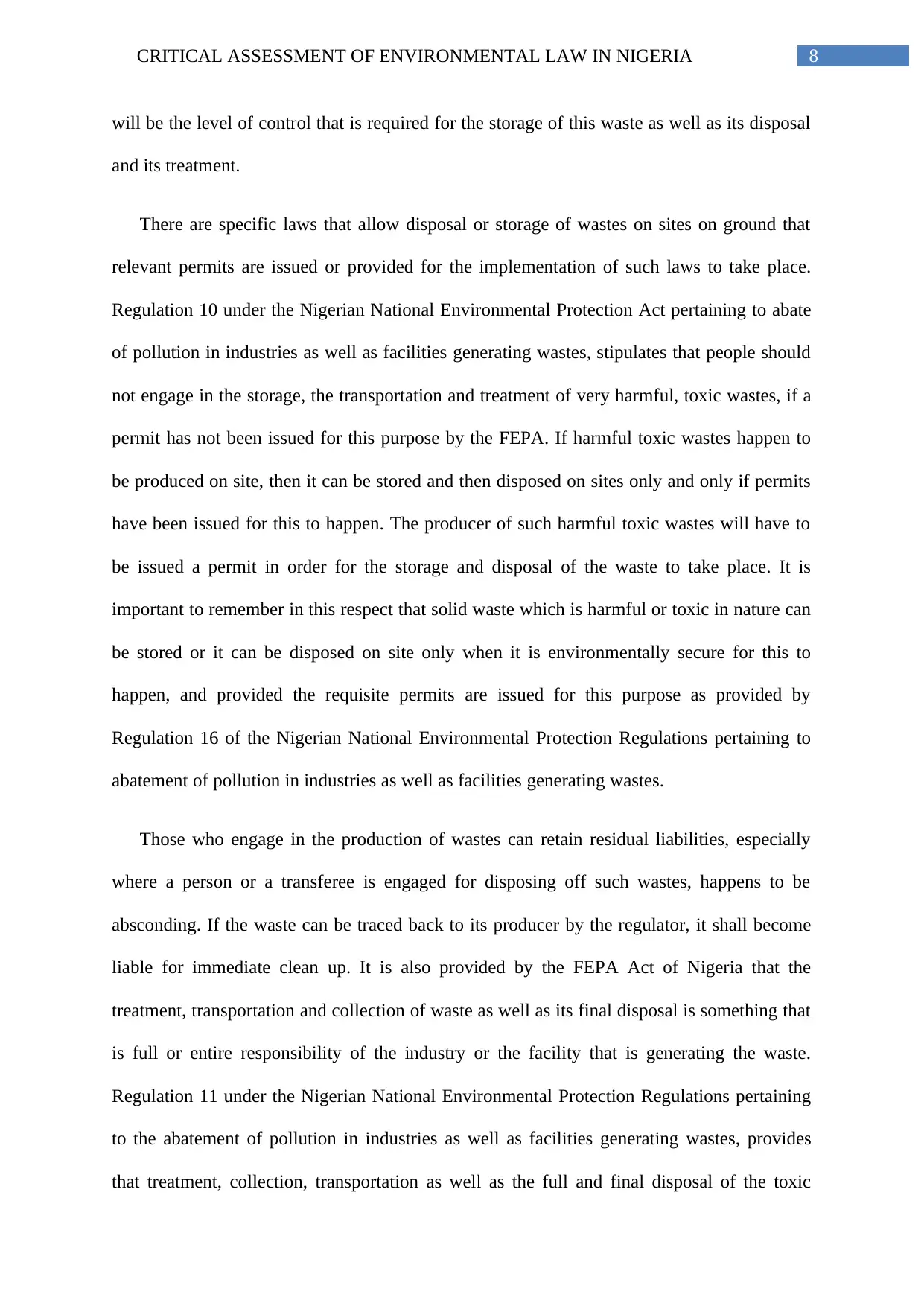
8CRITICAL ASSESSMENT OF ENVIRONMENTAL LAW IN NIGERIA
will be the level of control that is required for the storage of this waste as well as its disposal
and its treatment.
There are specific laws that allow disposal or storage of wastes on sites on ground that
relevant permits are issued or provided for the implementation of such laws to take place.
Regulation 10 under the Nigerian National Environmental Protection Act pertaining to abate
of pollution in industries as well as facilities generating wastes, stipulates that people should
not engage in the storage, the transportation and treatment of very harmful, toxic wastes, if a
permit has not been issued for this purpose by the FEPA. If harmful toxic wastes happen to
be produced on site, then it can be stored and then disposed on sites only and only if permits
have been issued for this to happen. The producer of such harmful toxic wastes will have to
be issued a permit in order for the storage and disposal of the waste to take place. It is
important to remember in this respect that solid waste which is harmful or toxic in nature can
be stored or it can be disposed on site only when it is environmentally secure for this to
happen, and provided the requisite permits are issued for this purpose as provided by
Regulation 16 of the Nigerian National Environmental Protection Regulations pertaining to
abatement of pollution in industries as well as facilities generating wastes.
Those who engage in the production of wastes can retain residual liabilities, especially
where a person or a transferee is engaged for disposing off such wastes, happens to be
absconding. If the waste can be traced back to its producer by the regulator, it shall become
liable for immediate clean up. It is also provided by the FEPA Act of Nigeria that the
treatment, transportation and collection of waste as well as its final disposal is something that
is full or entire responsibility of the industry or the facility that is generating the waste.
Regulation 11 under the Nigerian National Environmental Protection Regulations pertaining
to the abatement of pollution in industries as well as facilities generating wastes, provides
that treatment, collection, transportation as well as the full and final disposal of the toxic
will be the level of control that is required for the storage of this waste as well as its disposal
and its treatment.
There are specific laws that allow disposal or storage of wastes on sites on ground that
relevant permits are issued or provided for the implementation of such laws to take place.
Regulation 10 under the Nigerian National Environmental Protection Act pertaining to abate
of pollution in industries as well as facilities generating wastes, stipulates that people should
not engage in the storage, the transportation and treatment of very harmful, toxic wastes, if a
permit has not been issued for this purpose by the FEPA. If harmful toxic wastes happen to
be produced on site, then it can be stored and then disposed on sites only and only if permits
have been issued for this to happen. The producer of such harmful toxic wastes will have to
be issued a permit in order for the storage and disposal of the waste to take place. It is
important to remember in this respect that solid waste which is harmful or toxic in nature can
be stored or it can be disposed on site only when it is environmentally secure for this to
happen, and provided the requisite permits are issued for this purpose as provided by
Regulation 16 of the Nigerian National Environmental Protection Regulations pertaining to
abatement of pollution in industries as well as facilities generating wastes.
Those who engage in the production of wastes can retain residual liabilities, especially
where a person or a transferee is engaged for disposing off such wastes, happens to be
absconding. If the waste can be traced back to its producer by the regulator, it shall become
liable for immediate clean up. It is also provided by the FEPA Act of Nigeria that the
treatment, transportation and collection of waste as well as its final disposal is something that
is full or entire responsibility of the industry or the facility that is generating the waste.
Regulation 11 under the Nigerian National Environmental Protection Regulations pertaining
to the abatement of pollution in industries as well as facilities generating wastes, provides
that treatment, collection, transportation as well as the full and final disposal of the toxic
⊘ This is a preview!⊘
Do you want full access?
Subscribe today to unlock all pages.

Trusted by 1+ million students worldwide
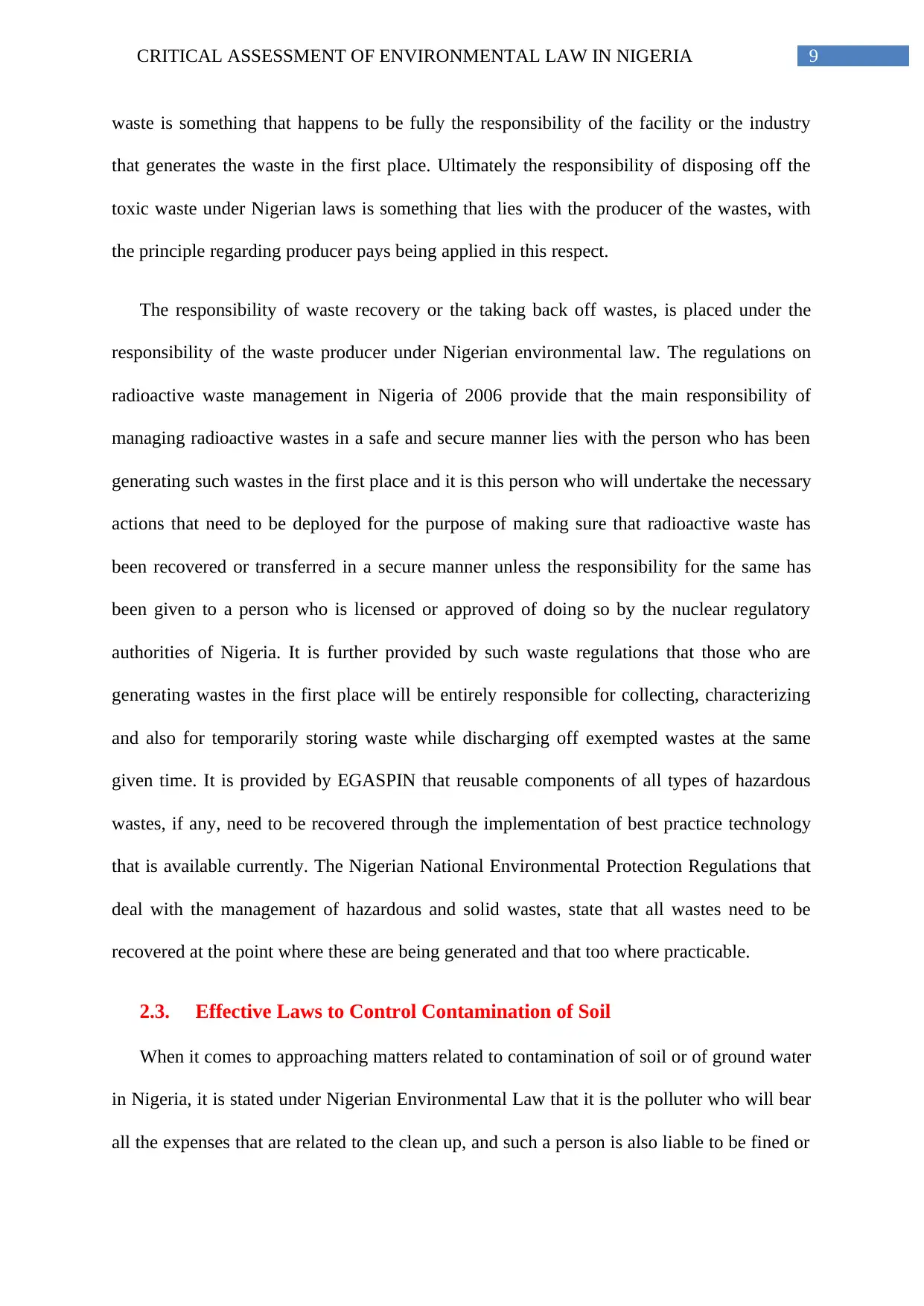
9CRITICAL ASSESSMENT OF ENVIRONMENTAL LAW IN NIGERIA
waste is something that happens to be fully the responsibility of the facility or the industry
that generates the waste in the first place. Ultimately the responsibility of disposing off the
toxic waste under Nigerian laws is something that lies with the producer of the wastes, with
the principle regarding producer pays being applied in this respect.
The responsibility of waste recovery or the taking back off wastes, is placed under the
responsibility of the waste producer under Nigerian environmental law. The regulations on
radioactive waste management in Nigeria of 2006 provide that the main responsibility of
managing radioactive wastes in a safe and secure manner lies with the person who has been
generating such wastes in the first place and it is this person who will undertake the necessary
actions that need to be deployed for the purpose of making sure that radioactive waste has
been recovered or transferred in a secure manner unless the responsibility for the same has
been given to a person who is licensed or approved of doing so by the nuclear regulatory
authorities of Nigeria. It is further provided by such waste regulations that those who are
generating wastes in the first place will be entirely responsible for collecting, characterizing
and also for temporarily storing waste while discharging off exempted wastes at the same
given time. It is provided by EGASPIN that reusable components of all types of hazardous
wastes, if any, need to be recovered through the implementation of best practice technology
that is available currently. The Nigerian National Environmental Protection Regulations that
deal with the management of hazardous and solid wastes, state that all wastes need to be
recovered at the point where these are being generated and that too where practicable.
2.3. Effective Laws to Control Contamination of Soil
When it comes to approaching matters related to contamination of soil or of ground water
in Nigeria, it is stated under Nigerian Environmental Law that it is the polluter who will bear
all the expenses that are related to the clean up, and such a person is also liable to be fined or
waste is something that happens to be fully the responsibility of the facility or the industry
that generates the waste in the first place. Ultimately the responsibility of disposing off the
toxic waste under Nigerian laws is something that lies with the producer of the wastes, with
the principle regarding producer pays being applied in this respect.
The responsibility of waste recovery or the taking back off wastes, is placed under the
responsibility of the waste producer under Nigerian environmental law. The regulations on
radioactive waste management in Nigeria of 2006 provide that the main responsibility of
managing radioactive wastes in a safe and secure manner lies with the person who has been
generating such wastes in the first place and it is this person who will undertake the necessary
actions that need to be deployed for the purpose of making sure that radioactive waste has
been recovered or transferred in a secure manner unless the responsibility for the same has
been given to a person who is licensed or approved of doing so by the nuclear regulatory
authorities of Nigeria. It is further provided by such waste regulations that those who are
generating wastes in the first place will be entirely responsible for collecting, characterizing
and also for temporarily storing waste while discharging off exempted wastes at the same
given time. It is provided by EGASPIN that reusable components of all types of hazardous
wastes, if any, need to be recovered through the implementation of best practice technology
that is available currently. The Nigerian National Environmental Protection Regulations that
deal with the management of hazardous and solid wastes, state that all wastes need to be
recovered at the point where these are being generated and that too where practicable.
2.3. Effective Laws to Control Contamination of Soil
When it comes to approaching matters related to contamination of soil or of ground water
in Nigeria, it is stated under Nigerian Environmental Law that it is the polluter who will bear
all the expenses that are related to the clean up, and such a person is also liable to be fined or
Paraphrase This Document
Need a fresh take? Get an instant paraphrase of this document with our AI Paraphraser
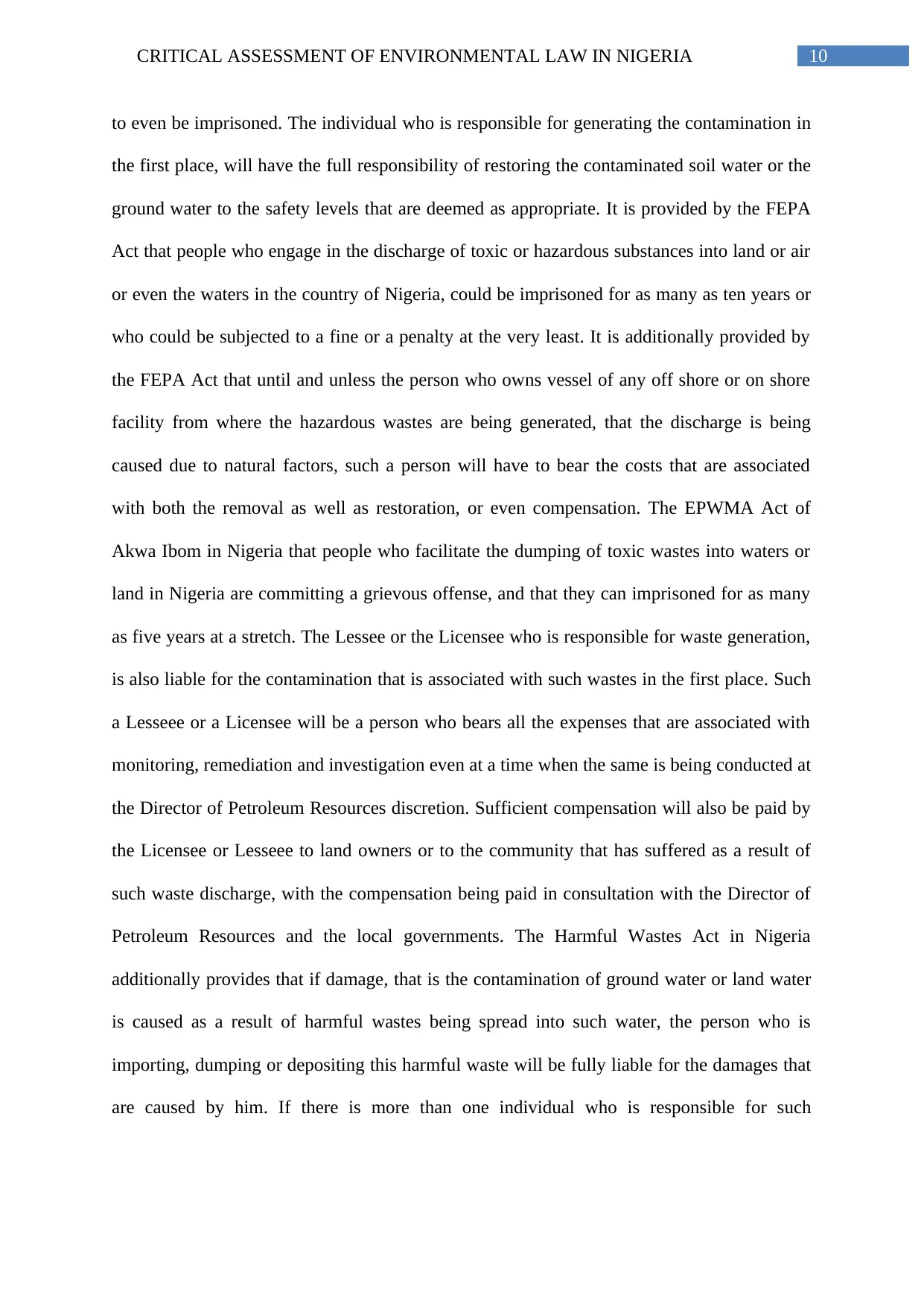
10CRITICAL ASSESSMENT OF ENVIRONMENTAL LAW IN NIGERIA
to even be imprisoned. The individual who is responsible for generating the contamination in
the first place, will have the full responsibility of restoring the contaminated soil water or the
ground water to the safety levels that are deemed as appropriate. It is provided by the FEPA
Act that people who engage in the discharge of toxic or hazardous substances into land or air
or even the waters in the country of Nigeria, could be imprisoned for as many as ten years or
who could be subjected to a fine or a penalty at the very least. It is additionally provided by
the FEPA Act that until and unless the person who owns vessel of any off shore or on shore
facility from where the hazardous wastes are being generated, that the discharge is being
caused due to natural factors, such a person will have to bear the costs that are associated
with both the removal as well as restoration, or even compensation. The EPWMA Act of
Akwa Ibom in Nigeria that people who facilitate the dumping of toxic wastes into waters or
land in Nigeria are committing a grievous offense, and that they can imprisoned for as many
as five years at a stretch. The Lessee or the Licensee who is responsible for waste generation,
is also liable for the contamination that is associated with such wastes in the first place. Such
a Lesseee or a Licensee will be a person who bears all the expenses that are associated with
monitoring, remediation and investigation even at a time when the same is being conducted at
the Director of Petroleum Resources discretion. Sufficient compensation will also be paid by
the Licensee or Lesseee to land owners or to the community that has suffered as a result of
such waste discharge, with the compensation being paid in consultation with the Director of
Petroleum Resources and the local governments. The Harmful Wastes Act in Nigeria
additionally provides that if damage, that is the contamination of ground water or land water
is caused as a result of harmful wastes being spread into such water, the person who is
importing, dumping or depositing this harmful waste will be fully liable for the damages that
are caused by him. If there is more than one individual who is responsible for such
to even be imprisoned. The individual who is responsible for generating the contamination in
the first place, will have the full responsibility of restoring the contaminated soil water or the
ground water to the safety levels that are deemed as appropriate. It is provided by the FEPA
Act that people who engage in the discharge of toxic or hazardous substances into land or air
or even the waters in the country of Nigeria, could be imprisoned for as many as ten years or
who could be subjected to a fine or a penalty at the very least. It is additionally provided by
the FEPA Act that until and unless the person who owns vessel of any off shore or on shore
facility from where the hazardous wastes are being generated, that the discharge is being
caused due to natural factors, such a person will have to bear the costs that are associated
with both the removal as well as restoration, or even compensation. The EPWMA Act of
Akwa Ibom in Nigeria that people who facilitate the dumping of toxic wastes into waters or
land in Nigeria are committing a grievous offense, and that they can imprisoned for as many
as five years at a stretch. The Lessee or the Licensee who is responsible for waste generation,
is also liable for the contamination that is associated with such wastes in the first place. Such
a Lesseee or a Licensee will be a person who bears all the expenses that are associated with
monitoring, remediation and investigation even at a time when the same is being conducted at
the Director of Petroleum Resources discretion. Sufficient compensation will also be paid by
the Licensee or Lesseee to land owners or to the community that has suffered as a result of
such waste discharge, with the compensation being paid in consultation with the Director of
Petroleum Resources and the local governments. The Harmful Wastes Act in Nigeria
additionally provides that if damage, that is the contamination of ground water or land water
is caused as a result of harmful wastes being spread into such water, the person who is
importing, dumping or depositing this harmful waste will be fully liable for the damages that
are caused by him. If there is more than one individual who is responsible for such
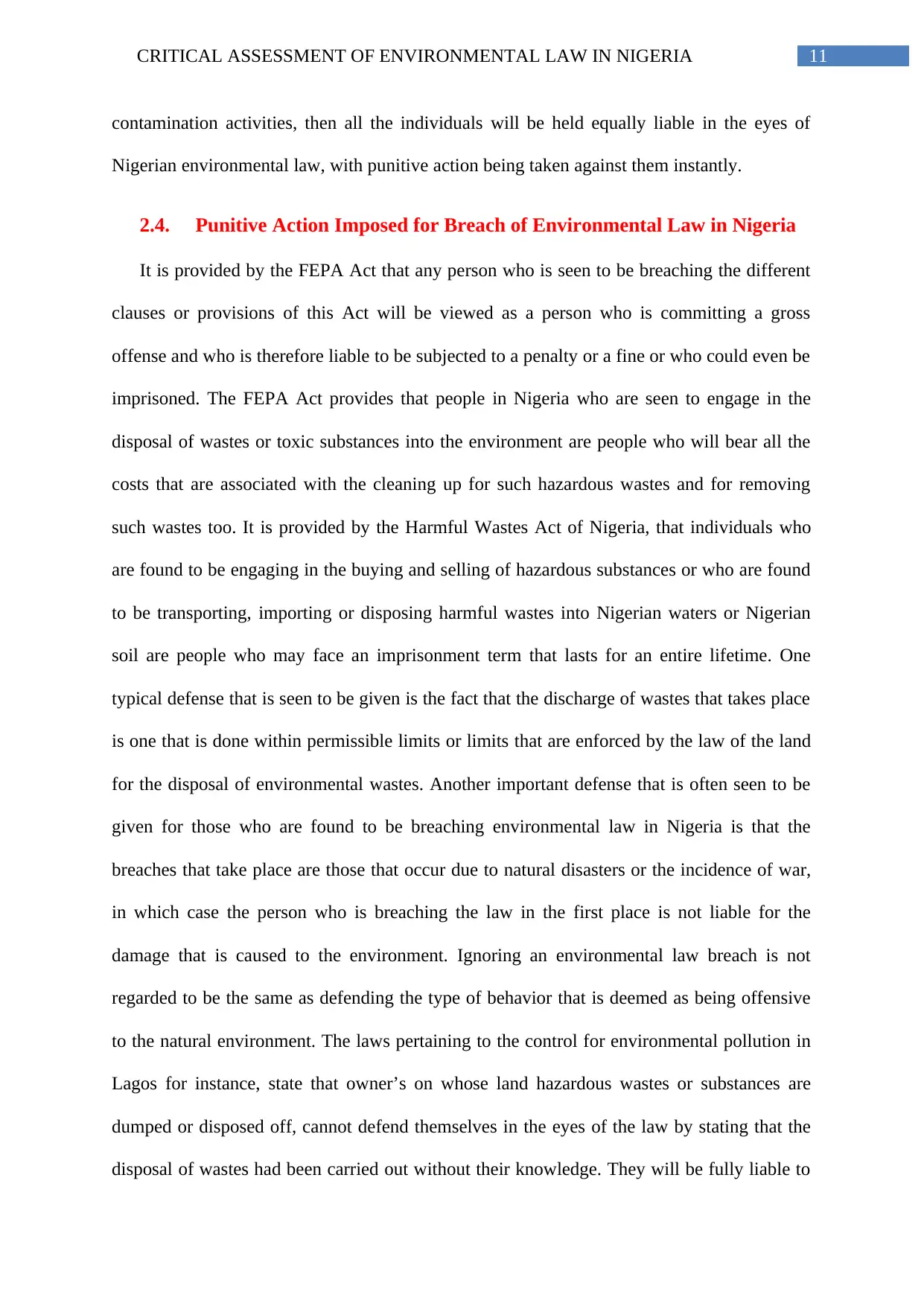
11CRITICAL ASSESSMENT OF ENVIRONMENTAL LAW IN NIGERIA
contamination activities, then all the individuals will be held equally liable in the eyes of
Nigerian environmental law, with punitive action being taken against them instantly.
2.4. Punitive Action Imposed for Breach of Environmental Law in Nigeria
It is provided by the FEPA Act that any person who is seen to be breaching the different
clauses or provisions of this Act will be viewed as a person who is committing a gross
offense and who is therefore liable to be subjected to a penalty or a fine or who could even be
imprisoned. The FEPA Act provides that people in Nigeria who are seen to engage in the
disposal of wastes or toxic substances into the environment are people who will bear all the
costs that are associated with the cleaning up for such hazardous wastes and for removing
such wastes too. It is provided by the Harmful Wastes Act of Nigeria, that individuals who
are found to be engaging in the buying and selling of hazardous substances or who are found
to be transporting, importing or disposing harmful wastes into Nigerian waters or Nigerian
soil are people who may face an imprisonment term that lasts for an entire lifetime. One
typical defense that is seen to be given is the fact that the discharge of wastes that takes place
is one that is done within permissible limits or limits that are enforced by the law of the land
for the disposal of environmental wastes. Another important defense that is often seen to be
given for those who are found to be breaching environmental law in Nigeria is that the
breaches that take place are those that occur due to natural disasters or the incidence of war,
in which case the person who is breaching the law in the first place is not liable for the
damage that is caused to the environment. Ignoring an environmental law breach is not
regarded to be the same as defending the type of behavior that is deemed as being offensive
to the natural environment. The laws pertaining to the control for environmental pollution in
Lagos for instance, state that owner’s on whose land hazardous wastes or substances are
dumped or disposed off, cannot defend themselves in the eyes of the law by stating that the
disposal of wastes had been carried out without their knowledge. They will be fully liable to
contamination activities, then all the individuals will be held equally liable in the eyes of
Nigerian environmental law, with punitive action being taken against them instantly.
2.4. Punitive Action Imposed for Breach of Environmental Law in Nigeria
It is provided by the FEPA Act that any person who is seen to be breaching the different
clauses or provisions of this Act will be viewed as a person who is committing a gross
offense and who is therefore liable to be subjected to a penalty or a fine or who could even be
imprisoned. The FEPA Act provides that people in Nigeria who are seen to engage in the
disposal of wastes or toxic substances into the environment are people who will bear all the
costs that are associated with the cleaning up for such hazardous wastes and for removing
such wastes too. It is provided by the Harmful Wastes Act of Nigeria, that individuals who
are found to be engaging in the buying and selling of hazardous substances or who are found
to be transporting, importing or disposing harmful wastes into Nigerian waters or Nigerian
soil are people who may face an imprisonment term that lasts for an entire lifetime. One
typical defense that is seen to be given is the fact that the discharge of wastes that takes place
is one that is done within permissible limits or limits that are enforced by the law of the land
for the disposal of environmental wastes. Another important defense that is often seen to be
given for those who are found to be breaching environmental law in Nigeria is that the
breaches that take place are those that occur due to natural disasters or the incidence of war,
in which case the person who is breaching the law in the first place is not liable for the
damage that is caused to the environment. Ignoring an environmental law breach is not
regarded to be the same as defending the type of behavior that is deemed as being offensive
to the natural environment. The laws pertaining to the control for environmental pollution in
Lagos for instance, state that owner’s on whose land hazardous wastes or substances are
dumped or disposed off, cannot defend themselves in the eyes of the law by stating that the
disposal of wastes had been carried out without their knowledge. They will be fully liable to
⊘ This is a preview!⊘
Do you want full access?
Subscribe today to unlock all pages.

Trusted by 1+ million students worldwide
1 out of 19
Related Documents
Your All-in-One AI-Powered Toolkit for Academic Success.
+13062052269
info@desklib.com
Available 24*7 on WhatsApp / Email
![[object Object]](/_next/static/media/star-bottom.7253800d.svg)
Unlock your academic potential
Copyright © 2020–2026 A2Z Services. All Rights Reserved. Developed and managed by ZUCOL.





